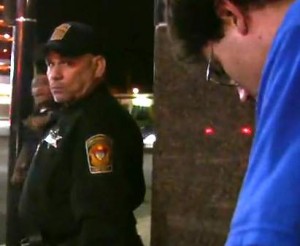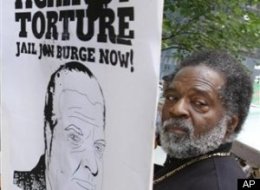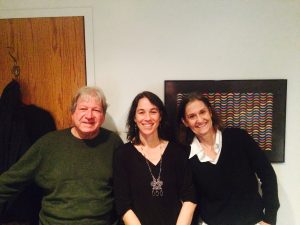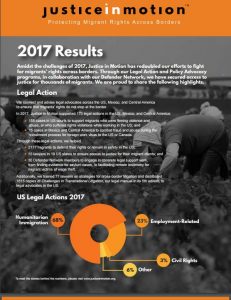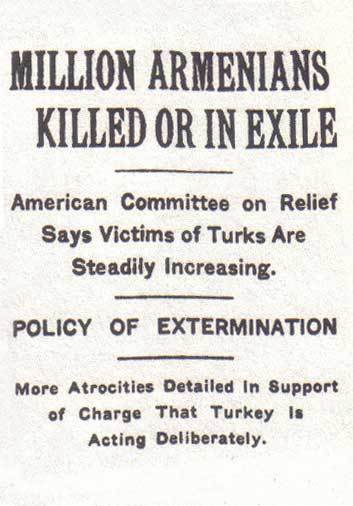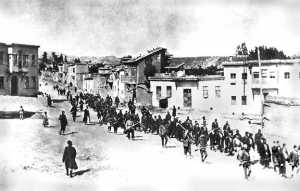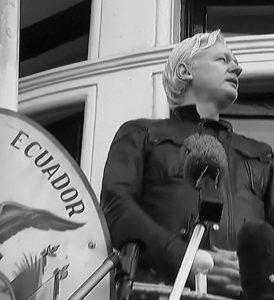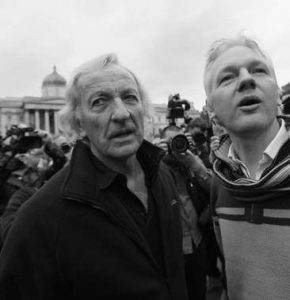Welcome to Law and Disorder Radio
Law and Disorder is a weekly independent civil liberties radio program airing on more than 150 stations and on Apple podcast. Law and Disorder provides timely legal perspectives on issues concerning civil liberties, privacy, right to dissent and practices of torture exercised by the US government and private corporations.
Law and Disorder April 30, 2018
Podcast: Play in new window | Download
Kisela vs Hughes: Qualified Immunity
All too often government officials including law-enforcement agencies get away with gross abuses of power because they invoke the doctrine of qualified immunity. This is a doctrine which protects police who kill civilians.
In the United States, 2,934 civilians were shot and killed by police since 2015. That is nearly 1000 people a year. In most European countries the number of people killed by the police is zero.
The doctrine of qualified immunity prevents government agents from being held personally responsible for constitutional violations unless the violation was of clearly established law. This is something nearly impossible to prove.
A Supreme Court decision two weeks ago in the Kisela vs Hughes case decided against the plaintiff victim of police abuse by a 7 to 2 majority two liberal justices Sotomayor and Ginsberg dissented. They opined that the majority of supreme court judges have established what they called an absolute shield protecting police from what they labeled palpably unreasonable action that will go unpunished.
Guest – Attorney G.Flint Taylor, a graduate of Brown University and Northwestern Law School, is a founding partner of the People’s Law Office in Chicago, an office which has been dedicated to litigating civil rights, police violence, government misconduct, and death penalty cases for more than 40 years.
Guest – Attorney Ben Elson is a partner at the People’s Law Office. His practice focuses on representing victims of police and other governmental misconduct in civil rights cases, including people who have been wrongfully convicted, subjected to police brutality, and denied medical attention. He has obtained tens of millions of dollars in compensation for his clients through verdicts and settlements.
—-
Lawyers You’ll Like: Cathleen Caron – Justice In Motion
Attorneys who represent migrant workers face a host of challenges in transnational employment litigation. Some of these challenges range from not being able to obtain a visa for clients posed to begin trial but are physically back at home in Guatemala or another country, and cannot return to testify. Or clients may be entitled to past wages but their US lawyers are unable to find them once they have left the States.
For some lawyers, it’s cost-prohibitive to keep in contact or to track down clients when the case goes to trial and forgo representing them entirely.
This is where the organization Justice in Motion comes in. Their unique cross-borer model helps advocates and migrants overcome these barriers to what they call portable justice. Their mission is to ensure that migrants who suffered exploitation abroad are able to access justice even if they have returned to their home countries. They connect advocates and defenders, and support the development of cases to ensure that transnational litigation is working effectively and smoothly on behalf of migrants. They play a pivotal role in persuading attorneys to work on cases with a transnational dimension, and to not forgo them because of legal or logistical obstacles. This has led to a significant increase in the number of advocates in the region providing transnational legal services to migrants. Justice In Motion 2017 Brochure
Guest – Attorney Cathleen Caron, National Lawyers Guild member, Cathleen is the founding executive director of Justice in Motion, and she’s also one of our Lawyers You’ll Like. Cathleen has more than twenty years of human rights experience in the United States and abroad. Prior to launching Justice in Motion (formerly known as Global Workers Justice Alliance), she was in East Timor where she directed a national needs assessment of the human trafficking situation for the Alola Foundation, chaired by East Timor’s First Lady.
—————
—————
Law and Disorder April 23, 2018
Podcast: Play in new window | Download
Speaking In Turkish: Denying the Armenian Genocide
Around the world, April 24 marks the observance of the Armenian Genocide. On that day in 1915 the Interior Minister of the Ottoman Empire ordered the arrest and hangings of Armenian intellectuals and community leaders in Constantinople. It was the beginning of a systematic and well-documented plan to eliminate the Armenians, who were Christian, and who had been under Ottoman rule and treated as second class citizens since the 15th century.
The unspeakable and gruesome nature of the killings—beheadings of groups of babies, dismemberments, mass burnings, mass drownings, use of toxic gas, lethal injections of morphine or injections with the blood of typhoid fever patients—render oral histories particularly difficult for survivors of the victims.
Why did this happen? Despite being deemed inferior to Turkish Muslims, the Armenian community had attained a prestigious position in the Ottoman Empire and the central authorities there grew apprehensive of their power and longing for a homeland. The concerted plan of deportation and extermination was effected, in large part, because World War I demanded the involvement and concern of potential allied countries. As the writer Grigoris Balakian wrote, the war provided the Turkish government “their sole opportunity, one unprecedented” to exploit the chaos of war in order to carry out their extermination plan.
As Armenians escaped to several countries, including the United States, a number came to New Britain, Connecticut in 1892 to work in the factories of what was then known as the hardware capital of the world. By 1940 nearly 3,000 Armenians lived there in a tight-knit community.
Pope Frances calls it a duty not to forget “the senseless slaughter” of an estimated one and a half million Armenians by the Ottoman Turks from 1915 to 1923. “Concealing or denying evil is like allowing a wound to keep bleeding without bandaging it,” the Pope said just two weeks before the 100th anniversary of the systematic implementation of a plan to exterminate the Armenian race.
Special thanks to Jennie Garabedian, Arthur Sheverdian, Ruth Swisher, Harry Mazadoorian, and Roxie Maljanian. Produced and written by Heidi Boghosian and Geoff Brady.
———————————————
Law and Disorder April 16, 2018
Podcast: Play in new window | Download
Mass Support Needed For Julian Assange
Two weeks ago, WikiLeaks founder and internet publisher Julian Assange , who is holed up in the Ecuadorian embassy in London, had his Internet access cut off due to pressure by the British and American governments on Ecuador. Ecuador had granted him political asylum in their embassy where he has been living in two small sunless rooms for five years. Ecuador gave him political asylum after he sought refuge in the embassy to avoid extradition to Sweden, which would have sent him to the US. Assange was under protracted investigation for a rape claim, made up by the Swedish police and Swedish prosecutor and denied by the purported women victim. Sweden finally dropped the case, but Assange remains subject to arrest in Britain jumping bail.
Assange and WikiLeaks had been steadily revealing the war crimes and illegalities of the American government since it first published the Iraq war logs eight years ago. The war logs included video footage of American soldiers assassinating Iraqi civilians and a Reuters journalist. Chelsea Manning, who was recently released after seven years in prison, furnished WikiLeaks with the war logs.
The United States government is seeking to capture Assange and bring him back to the United States to stand trial for espionage, a crime which carries the death penalty.
Guest – John Pilger, an Australian-British journalist based in London. John has worked in many facets of journalism, including a correspondent in the Vietnam War, the Middle East Desk for Reuters in London, a documentary film maker, and a producer for the Independent Television Network in London. Pilger is known for his conscience, bravery and acute historical insight. His articles appear worldwide in newspapers such as the Guardian, the Independent, the New York Times, the Los Angeles Times.
—-
You Thought We Wouldn’t Notice: Intellectual Property
Laws protecting artwork and intellectual property are increasingly being put to the test amid claims from rising artists marketing their work online whose work is being copied by others.
Art piracy can include music posters, clothing design, book cover art, signage, record sleeve art, and typography. Under copyright law, one artist using another artist’s idea is generally legal, while one artist using another’s expression of that idea is generally illegal. Only a fact-intensive analysis can provide a bit of clarity, and even that is subject to a judge’s or jury’s review.
Sometimes copyright cases expand into major litigation. A New York judge recently ruled that graffiti, or aerosol artists, were entitled to a $6.7 million verdict after New York developer Gerald Wolkoff destroyed their well-known public work. The claim in the so-called FivePointz case arose under the Visual Artists’ Rights Act, or VARA. It’s the kind of case that attorney Scott Burroughs says rarely goes to trial. Several artists created aerosol art pieces on the walls of an abandoned development in the once downtrodden and now gentrified neighborhood of Long Island City, Queens. Wolkoff destroyed their art as part of a development plan. Read Scott’s Column Above The Law.
Guest – Attorney Scott Burroughs, an advocate for artists’ rights who curates the art law blog You Thought We Wouldn’t Notice and has a weekly copyright law column on legal website Above the Law.
———————————————-
